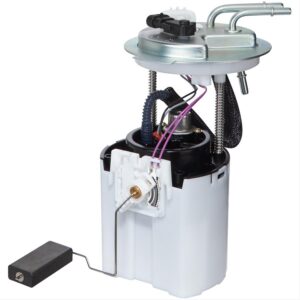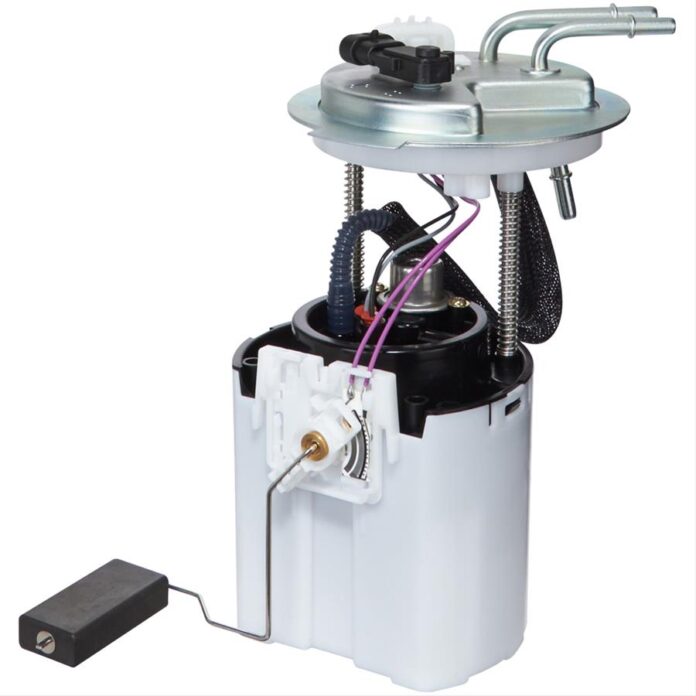The Hyundai Getz is a reliable and popular vehicle on the roads, but beneath its sturdy exterior, a common issue lurks, threatening to leave its owners stranded and frustrated. Crafted with precision engineering and built to Hyundai’s rigorous standards, the Hyundai Getz fuel pump embodies reliability and durability. Whether navigating bustling city streets or cruising along the open road, drivers can trust this essential component’s consistent fuel delivery. Designed to integrate with the Getz’s engine system seamlessly, the fuel pump optimizes fuel flow and pressure, ensuring efficient combustion and maximizing engine output.
Common Causes of Fuel Pump Problems in Hyundai Getz
A faulty fuel pump is one of the most frustrating and debilitating issues that can plague a Hyundai Getz owner. The fuel pump is the heart of the vehicle’s fuel system and delivers fuel to the engine at the right pressure and volume. When it fails, the engine can sputter, stall, or even refuse to start, leaving you stranded on the side of the road. But what causes these problems in the first place?
In many cases, the culprit is a clogged fuel filter, which can restrict fuel flow and put excessive pressure on the pump. Other common causes include worn or damaged fuel pump components, such as the pump’s motor or fuel pressure regulator, which can decrease fuel pressure and flow.
Contamination of the fuel system, such as water or debris in the fuel tank, can also cause fuel pump problems. Finally, electrical issues, such as a faulty fuel pump relay or wiring problem, can also prevent the fuel pump from functioning properly. By understanding the common causes of fuel pump problems in Hyundai Getz, you can take steps to prevent them from occurring in the first place or diagnose and repair them quickly if they do arise.
Diagnosing the Warning Signs of a Faulty Fuel Pump
As the lifeblood of your Hyundai Getz’s engine, the fuel pump plays a crucial role in delivering the necessary fuel to keep your car running smoothly. However, when it starts to malfunction, it can lead to many frustrating and potentially costly problems. But, before you’re left stranded on the side of the road, several warning signs can indicate a faulty fuel pump.
One of the most common indicators is a decrease in fuel pressure, which can cause your engine to stall or sputter, especially when accelerating or driving uphill. Another telltale sign is a whining or humming noise from the fuel tank area, which can signal a failing fuel pump motor. You may also notice a decrease in fuel efficiency as your engine struggles to get the fuel it needs, leading to poor performance and reduced power.
Additionally, if your car’s “Check Engine” light illuminates on your dashboard, it could be a sign of a faulty fuel pump, as many modern vehicles are equipped with sensors that detect fuel pump issues. By being aware of these warning signs, you can take prompt action to diagnose and address any fuel pump problems before they leave you stranded.
Troubleshooting and Repairing a Faulty Fuel Pump
When troubleshooting and repairing a faulty fuel pump in your Hyundai Getz, it’s essential to approach the issue with an organized and systematic mindset. Start by identifying the symptoms of a defective fuel pump, such as a loss of power, rough idling, or a “check engine” light on your dashboard.
From there, a combination of visual inspections, diagnostic tools, and testing procedures will isolate the problem and determine whether the fuel pump is the culprit. Once you’ve confirmed the diagnosis, it’s time to get your hands dirty. Depending on the extent of the problem, you may need to replace the fuel pump, fuel filter, or other related components.
Be prepared to work in cramped spaces, such as underneath the vehicle or the engine compartment, and take necessary safety precautions to avoid injury or electrical shock. With patience, persistence, and the right tools, you can successfully repair or replace your Hyundai Getz’s fuel pump and confidently get back on the road.
Replacing a Faulty Fuel Pump: A Step-by-Step Guide
When replacing a faulty fuel pump in your Hyundai Getz, it’s essential to approach the task with precision and care. The process may seem daunting, but with the right tools and a clear understanding of the steps, you can confidently tackle the job and get your vehicle running smoothly again. Begin by gathering the necessary replacement parts, including the new fuel pump, fuel filter, and any additional components recommended by your mechanic or the manufacturer. Next, locate a safe and level surface to work on, ensuring the area is clear of any flammable materials.
With your vehicle securely raised, you’ll need to disconnect the battery and relieve the fuel system pressure to prevent accidental starts or fuel leaks. Then, you’ll need to access the fuel pump, which is typically located inside the fuel tank, and carefully remove the faulty unit.
Once the new fuel pump is installed, reconnect the necessary lines and hoses and replace the filter. Finally, restart the engine and check for any signs of leaks or malfunction. With patience and attention to detail, you can successfully replace your Hyundai Getz’s faulty fuel pump and get back on the road.
Preventative Maintenance to Avoid Future Fuel Pump Issues
Taking proactive measures to maintain your Hyundai-Getz’s fuel system can go a long way toward preventing fuel pump problems from arising. By incorporating these simple yet effective habits into your routine, you can significantly reduce the likelihood of fuel pump failure and ensure a smooth ride for years to come.
· Regular Fuel Filter Replacement
Regularly replacing your fuel filter can help prevent debris and contaminants from clogging your fuel pump, reducing the risk of premature failure. Make it a point to replace your fuel filter every 15,000 to 30,000 miles or as your Hyundai Getz’s manufacturer recommends.
· Proper Fueling Techniques
How you fuel your vehicle can also impact the performance of your fuel pump. Avoid filling up your tank to the brim, as this can cause pressure to build up and put excessive strain on your fuel pump. Additionally, avoid using low-quality fuel, as it can contain contaminants that can damage your fuel pump over time.

· Monitoring Your Fuel Pressure
Keeping an eye on your fuel pressure can help you identify potential issues before they become major problems. Invest in a fuel pressure gauge and regularly check your fuel pressure to ensure it’s within the recommended range.
· Avoiding Extreme Temperatures
Extreme temperatures can cause your fuel pump to work harder, leading to premature wear and tear. To reduce your car’s interior temperature, try parking it in a shaded area or using a sunshade.
· Scheduling Regular Tune-Ups
Finally, scheduling regular tune-ups with a qualified mechanic can help identify potential fuel pump issues before they become major problems. A mechanic can inspect your fuel system, replace worn-out components, and perform necessary repairs to keep your fuel pump running smoothly.
How Hyundai Getz Fuel Pump Enhances Performance and Mileage
The Hyundai Getz fuel pump plays a vital role in your Hyundai Getz’s overall performance and efficiency. It is responsible for delivering the right fuel to the engine, ensuring it runs smoothly and efficiently. A well-functioning fuel pump is essential to maintain optimal engine performance, which, in turn, affects the car’s overall mileage.
When the fuel pump is working correctly, it provides the necessary pressure to push fuel through the fuel injectors, atomizing the fuel into a fine mist that combusts efficiently. This results in better fuel economy and increased power output.
It translates to a more responsive and agile driving experience, quicker acceleration, and smoother gear shifts. Moreover, a healthy fuel pump helps to reduce emissions, minimize engine knocking or pinging, and prevent overheating, all of which can lead to costly repairs and decreased fuel efficiency. You can enjoy improved performance, better mileage, and a more reliable driving experience by ensuring that your fuel pump is in good condition.
Tips for Ensuring the Proper Functioning of the Fuel Pump
· Maintaining a Clean Fuel System
To ensure the proper functioning of the fuel pump, it’s essential to maintain a clean fuel system. Dirt, debris, and contaminants can clog the fuel pump and fuel injectors, leading to poor engine performance and decreased fuel efficiency. Regularly cleaning the fuel tank, fuel lines, and fuel injectors can help prevent these issues. Use a fuel system cleaner to remove dirt and debris, and consider installing a fuel filter to catch any impurities before they reach the fuel pump.
· Monitoring Fuel Pressure
Low fuel pressure is a common symptom of a failing fuel pump. Monitoring fuel pressure can help you identify potential problems before they become major. Use a fuel pressure gauge to check the fuel pressure and compare it to the recommended specifications in your Hyundai Getz’s repair manual. If the fuel pressure is low, it may be a sign of a faulty fuel pump.
· Avoiding Low Fuel Levels
Running the fuel tank too low can cause the pump to work harder, leading to premature wear and failure. To reduce the strain on the fuel pump, try to keep the fuel level above a quarter of a tank. Also, avoid driving on fumes, which can cause the fuel pump to overheat and fail.
· Using the Right Fuel
Using the right fuel type can help extend the fuel pump’s life. Ensure to use the fuel the manufacturer recommends, as specified in the owner’s manual. Using the wrong kind of fuel can cause the fuel pump to work harder, leading to premature failure.
· Scheduling Regular Maintenance
Regular maintenance is key to ensuring the proper functioning of the fuel pump. Schedule tune-ups and maintenance checks to identify potential problems before they become major. Inspect and clean the fuel system during these checks and replace any worn or damaged components.
Conclusion
In conclusion, Hyundai Getz fuel pump problems can be frustrating and costly for car owners. However, with the right knowledge and understanding of the common causes and symptoms, you can take proactive steps to prevent or address these problems. By following the tips and solutions outlined in this guide, you can help ensure that your Hyundai Getz runs smoothly and efficiently, and avoid the financial burden of costly repairs. Remember, regular maintenance and inspections are key to preventing fuel pump problems and addressing issues promptly can help prevent more serious damage to your vehicle.
FAQS
Q: What Are The Most Common Symptoms Of A Faulty Fuel Pump In A Hyundai Getz?
A: The most common symptoms include difficulty starting the engine, engine stalling, and poor engine performance.
Q: Can I Replace The Fuel Pump Myself?
A: While it’s possible to replace the fuel pump yourself, it’s recommended to have a professional mechanic do the job to ensure it’s done correctly and safely.
Q: How Often Should I Have My Fuel Pump Inspected?
A: Your fuel pump should be inspected every 30,000 to 50,000 miles or as your vehicle’s manufacturer recommends.
| Other Good Articles to Read |
| Blogs-Nation |
| Blogs-Peoples |
| Bryan Smith Blogs |
| intellect blogs |
| the fault in our blogs |
| blogs eu |
| oz forums |
| recruitment blogs |
| zet blogs |
| id blogs |
| Blog Studio legale |
| blogs map |
| Related Business Listings |
| Contact Directory |
| Local Business Profiles |

